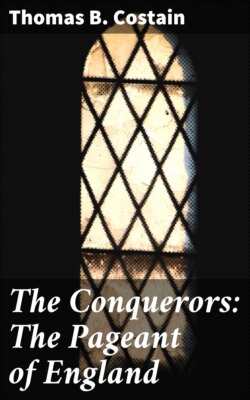Читать книгу The Conquerors: The Pageant of England - Thomas B. Costain - Страница 16
На сайте Литреса книга снята с продажи.
6
ОглавлениеTable of Contents
William had shown conspicuous ability all the years of his life, and near the close he was to demonstrate that what he possessed in reality was genius. At a midwinter assembly of the Witanagemot held at Gloucester twelve years after the Battle of Hastings, the King made a long speech. He was concerned, he said, about the condition of the country, the confusion brought about by so many wars, the lack of knowledge which existed of population and wealth. “By the splendor of God!” exclaimed William at the conclusion of his address, using his favorite oath. “We must know all about this land and what it contains. Today we know nothing.”
He stumbled for words as he began later to explain what was in his mind. The years had taken their toll and the great man who had never tasted defeat was as round as a barrel and slow in all his movements. But fat and old though he might be, he dominated the assembly so completely that no one raised an objection to the idea he was setting forth, although few of them had any conception of what it meant. This was not surprising, for certainly not more than a dozen of them could read or write. The mind of William had leaped centuries ahead to arrive at a method of restoring order in the land.
The King, needless to state, had his way. The nation was divided into nine districts, and a special commission was appointed for each, consisting of a bishop and a man of noble birth to govern the proceedings and a staff of clerks and scriveners to do the actual work. Each commission moved about the territory assigned to it, and all landowners and tenants were summoned to attend their meetings. Every man was questioned minutely, and the information he gave was later checked to insure honesty and accuracy. How much land did he hold? Who held it before he became the owner? How many people resided on it, and what was their condition? How many horses did he have, how many cows, sheep, goats? It was a slow and tedious proceeding. The old records had fallen into total confusion. Each county seemed to possess its own methods of land reckoning. The commissions dealt with trithings here, with wapentakes there. Elsewhere it would be ridings, hundreds, lathes, rapes, or leets. Some estates had never been surveyed; many had been fought over and burned and the matter of valuation was almost in the realm of guesswork. It was a complicated undertaking and took several years in the completion.
The result was Domesday Book, the document from which more than from any chronicle or history the truth about England at the start of Norman rule has been gleaned. It substituted facts and figures for the mass of vague information which had existed before. It marked the beginning of accuracy in deeds and registration, the commencement of statistical documentation which is a basis of historical truth. If William had done nothing else, his reputation as an able ruler and a man of vision could have rested on this one achievement.
William’s keen mind had gone as straight as an arrow to the proper method of establishing property order, but the motive which impelled him to act had more than a hint of selfishness. He had been realizing that inasmuch as his followers had been rewarded with practically all the land in England they must now bear the burden of government and defense out of the wealth thus acquired. But how could the necessary taxes be collected unless he knew what each man possessed and the size of his income? Domesday Book was the answer. As soon as it was completed, he levied an impost of six shillings on each hide of land (a vague measurement which took into account wasteland and water and was meant to represent what a free family needed for subsistence) and, as the Normans held most of the land, it meant that the newcomers paid the bulk of the tax. The royal revenues were increased as a result of Domesday to the extent of four hundred thousand pounds a year! It was a truly stupendous sum for those days. The barons groaned and gritted their teeth and expostulated bitterly, but William, studying the tax papers with a keen eye, paid no attention. The dispossessed Saxons found it a joke to their liking.
